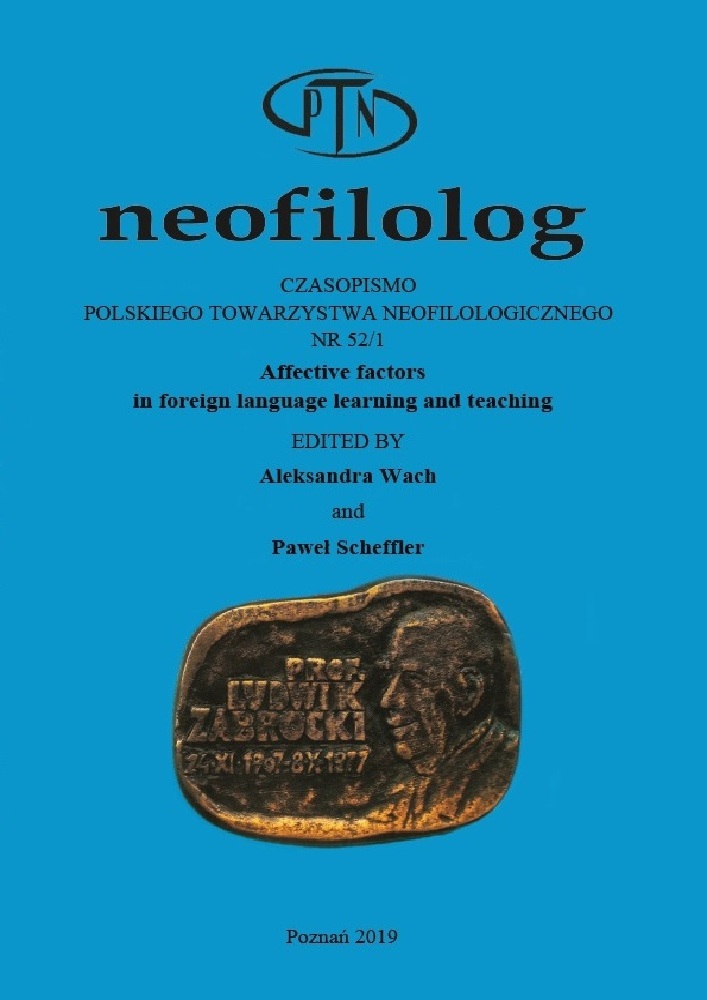Abstract
As language teachers, we have to pay attention to many things in our work but cognitive aspects of foreign or second language learning cannot provide all the information we need. If we also give attention to the affective domain, this can make our teaching more effective. In this article we will be considering some of the affective factors and exploring how they influence the process of language learning. Special emphasis will be placed on implications for teachers in the classroom.
References
Arnold J. (2011), Attention to affect in language learning (in) “Anglistik. International Journal of English Studies”, No 22/1, pp. 11-22.
Council of Europe. (2001), Common European Framework of Reference for Languages: Learning, Teaching, Assessment. doi: https://rm.coe.int/16802fc1bf
Ellis K. (2004), The impact of perceived teacher confirmation on receiver apprehension, motivation and learning (in) “Communication Education”, No 55/1, pp. 1-20.
Jensen E. (1998), Teaching with the brain in mind. Arlington, VA: ASCD.
León I. (2005), La confirmación del profesor de inglés percibida por el alumnado en educación secundaria. Unpublished MA thesis: Universidad de Sevilla, Seville.
North B., Piccardo E. (2016), Developing illustrative descriptors of aspects of mediation for the Common European Framework of Reference (CEFR). A Council of Europe project (in) “Language Teaching”, No 49/3, pp. 455-459.
Palmer P. (1998), The courage to teach. San Francisco: Jossey-Bass Publishers.
Stern H. H. (1983), Fundamental concepts of language teaching. Oxford: Oxford University Press.
Stevick E. W. (1980), Language teaching: A way and ways. Rowley, MA: Newbury House.
Rodríguez J., Plax T., Kearney P. (1996), Clarifying the relationship between teacher nonverbal immediacy and student cognitive learning: affective learning as the central causal mediator (in) “Communication Education”, No 45, pp. 294-305.
Underhill A. (1999), Facilitation in language teaching (in) Arnold J. (ed.), Affect in Language Learning. Cambridge: Cambridge University Press.
License
Copyright (c) 2019 Neofilolog

This work is licensed under a Creative Commons Attribution-NoDerivatives 4.0 International License.
Authors
Authors of texts accepted for publication in Neofilolog are required to complete, sign and return to the Editorial team’s office the Agreement for granting a royalty-free license to works with a commitment to grant a CC sub-license.
Under the agreement, the authors of the texts published in Neofilolog grant Adam Mickiewicz University in Poznań a non-exclusive, royalty-free license and authorize the use of Attribution-NoDerivatives 4.0 International (CC BY-ND 4.0) Creative Commons sub-license.
The authors retain the right to the free disposal of the work.
Users
Interested Internet users are entitled to use works that have been published in Neofilolog since 2017, under the following conditions:
▪ attribution – obligation to provide, together with the distributed work, information about the authorship, title, source (link to the original work, DOI) and the license itself.
▪ no derivatives – the work must be preserved in its original form. Without the author's consent, it is not possible to distribute the modified work in the form of translations, publications, etc.
Copyrights are reserved for all texts published since 2017.
Miscellaneous
Adam Mickiewicz University in Poznań retains the property right as a whole (layout, graphic form, title, cover design, logo etc.).

